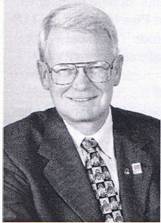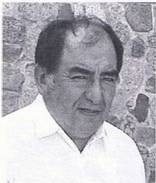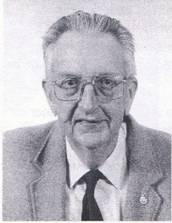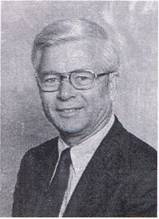2001 Honorary Life Member Selections
 DR. STEVEN A SLACK
DR. STEVEN A SLACK
Steven A Slack is a native of Arkansas. And completed a B.S. (1969) and M.S. (1971) in Plant Pathology from the University of Arkansas, Fayetteville. In 1974 he finished his Ph.D. degree in Plant Pathology from the University of California, Davis. He spent a year as a Post Doctoral Associate at UCDavis and then took the job of Director of the Wisconsin Seed Potato Certification Program. He held this position for fourteen years and made a name for himself as one of the consummate professionals in the field of seed potato certification.
Steve’s career took a prominent turn when he accepted the prestigious and endowed Henry and Mildred Uihlein Professor of Plant Pathology position at Cornell University where he directed the New York Seed Potato Certification Program. He stayed in this position for eleven years serving the last five as Chairman of the Department of Plant Pathology at Cornell. During this time, Steve became internationally recognized for his research efforts with bacterial ring rot and potato viruses, but also worked to develop in-vitro methods for tissue-culture propagation and maintenance of potatoes and on therapies to eliminate systemically invasive viruses. He has focused much of his efforts on the identification and utilization of genes for resistance to potato viruses and understanding the durability of these genes under field conditions. Steve currently serves as the Associate Vice President for Agricultural Administration at Ohio State University; a position well suited to his level of experience and expertise.
Dr. Steve Slack is the potato pathologist or virologist that other potato pathologists or virologists go to when they need advice. He has the support of both the academic community and the grower community having served both with distinction. He is known as a team player with an uncanny ability to distill and focus issues to their priority needs. Steve’s ability to negotiate real science and to bring his understanding of plant pathology down to layman’s terms have made him a popular speaker. Finally, Steve is known as being truly supportive in all situations by those individuals fortunate enough to have worked with him.
Steve has demonstrated vital leadership both in the seed potato industry and among his peers. Significant accomplishments include helping to USDA/APHIS formulate the PVY N Management Plan between the U.S. and Canada and working with the Golden Nematode Technical Work Group. Steve has published over 80 articles in refereed journals and several book chapters and has given numerous presentations to industry and scientific groups. He is a strong supporter of the National Potato Council and has spoken at several NPC Annual Seed Seminars. He has been active in the American Phytopathological Association as an Associate Editor for Phytopathology and Plant Disease, Editor-in-Chief for APS Press and serving as President of the Association in 2000/01.
Steve has also been an outstanding advocate of The Potato Association of America both nationally and in an international capacity. He has served on the Executive Board, on the Editorial Board, in numerous committees and in many capacities in various Sections and was President of the Association in 1988/89.
— Robert Davidson and Richard Zink, Nominators
 ING ALBERTO SALAS
ING ALBERTO SALAS
Ing. Alberto Salas, a native of Peru’s rugged highland region, received his undergraduate and advanced training in the 1970s at the Agrarian University La Molina, in Lima. He started his career in the University’s potato program as an assistant to the world famous potato taxonomist, Carlos Ochoa. He joined the International Potato Center (CIP) as assistant to Ochoa in 1975. During more than 20 years of work at CIP, Ing. Salas conducted 61 plant collection expeditions in Peru, Venezuela, Ecuador, Bolivia, and the United States. Each year since the mid-1970s Salas has carried out 1-3 expeditions, except when terrorist activities made it impossible to travel to the remote locations where wild species can still be found. Over the years, he has journeyed more than 50,000 km over dirt roads, mostly by mule or on foot.
Ing. Salas has shown an unusual devotion to the search for endangered wild potato species. Many times he sacrificed participation in important family events and celebrations to be in the field. Christmas of 1982 found him in an isolated village near Queara, Bolivia, where he collected S. bombycinum Ochoa and S. neovavilovii Ochoa, two species that were then unknown to science. In 1998, he celebrated his birthday in the remote village of Airihuanca, Peru, where found the only living samples of S. longiusculus Ochoa.
On several occasions he risked his life for the sake of his mission. For example, in 1976, while gathering samples in the Andahuaylas region of Peru, his vehicle was stranded in the middle of a fast moving, rain-swelled river. Rather than abandon his samples, Salas waited throughout the night until help appeared. On another occasion his vehicle was commandeered by Shining Path guerillas. Because he spoke Quechua, the local language, and because he agreed to “donate” money, food, and other supplies, he was released unharmed. On one occasion he nearly drowned when his horse stumbled while crossing a river. The risks, Salas believes, were worth the results. His expeditions have yielded invaluable germplasm, now available in CIP genebanks. He also supplied the materials needed for a comprehensive study of the genetic diversity in the tuber-bearing Solanum in section Petota. The materials he collected comprise ten new wild potato species that were later described by Prof. Ochoa. One of the new species was named in his honor, S. salasianum Ochoa.
In recent years, Ing. Salas has collaborated with NRSP-6 in collecting expeditions to the United States, Peru (two expeditions in 1998 and 1999), and in 2000 to Honduras and Panama. His collaboration was critical to these missions. His work is recognized far beyond the confines CIP, as much of his material is now routinely distributed to potato researchers worldwide. Indeed, the future value of many of the wild, tuber-bearing Solanum species that Ing. Salas discovered, collected, and helped to characterize will inevitably provide new sources of genes for use by future generations of scientists.
Ing. Alberto Salas, a native of Peru’s rugged highland region, received his undergraduate and advanced training in the 1970s at the Agrarian University La Molina, in Lima. He started his career in the University’s potato program as an assistant to the world famous potato taxonomist, Carlos Ochoa. He joined the International Potato Center (CIP) as assistant to Ochoa in 1975. During more than 20 years of work at CIP, Ing. Salas conducted 61 plant collection expeditions in Peru, Venezuela, Ecuador, Bolivia, and the United States. Each year since the mid-1970s Salas has carried out 1-3 expeditions, except when terrorist activities made it impossible to travel to the remote locations where wild species can still be found. Over the years, he has journeyed more than 50,000 km over dirt roads, mostly by mule or on foot.
Ing. Salas has shown an unusual devotion to the search for endangered wild potato species. Many times he sacrificed participation in important family events and celebrations to be in the field. Christmas of 1982 found him in an isolated village near Queara, Bolivia, where he collected S. bombycinum Ochoa and S. neovavilovii Ochoa, two species that were then unknown to science. In 1998, he celebrated his birthday in the remote village of Airihuanca, Peru, where found the only living samples of S. longiusculus Ochoa.
On several occasions he risked his life for the sake of his mission. For example, in 1976, while gathering samples in the Andahuaylas region of Peru, his vehicle was stranded in the middle of a fast moving, rain-swelled river. Rather than abandon his samples, Salas waited throughout the night until help appeared. On another occasion his vehicle was commandeered by Shining Path guerillas. Because he spoke Quechua, the local language, and because he agreed to “donate” money, food, and other supplies, he was released unharmed. On one occasion he nearly drowned when his horse stumbled while crossing a river. The risks, Salas believes, were worth the results. His expeditions have yielded invaluable germplasm, now available in CIP genebanks. He also supplied the materials needed for a comprehensive study of the genetic diversity in the tuber-bearing Solanum in section Petota. The materials he collected comprise ten new wild potato species that were later described by Prof. Ochoa. One of the new species was named in his honor, S. salasianum Ochoa.
In recent years, Ing. Salas has collaborated with NRSP-6 in collecting expeditions to the United States, Peru (two expeditions in 1998 and 1999), and in 2000 to Honduras and Panama. His collaboration was critical to these missions. His work is recognized far beyond the confines CIP, as much of his material is now routinely distributed to potato researchers worldwide. Indeed, the future value of many of the wild, tuber-bearing Solanum species that Ing. Salas discovered, collected, and helped to characterize will inevitably provide new sources of genes for use by future generations of scientists.
David M. Spooner & Charles R. Brown, Nominators
 DR. HIELKE (HENRY) DE JONG
DR. HIELKE (HENRY) DE JONG
Henry De Jong grew up and received his first horticultural training in the Netherlands before he immigrated to Canada in 1954. He continued his studies in Kansas and also took time to work with the Mennonite Central Committee in Bolivia and in the canning industry in Southern Ontario. In 1968, with his wife Siegelinde and three young children (Walter, Werner and Margaret) Henry moved to Wisconsin to complete his Ph.D. at the University of Wisconsin under Roger Rowe at the Potato Introduction Project, Sturgeon Bay (now NRSP-6). Henry joined Agriculture and Agri-Food Canada in 1971 in Morden, Manitoba, to work on buckwheat, and a year later moved to the Potato Research Centre, Fredericton, to commence a career in potato research. He retired on March 30, 2001.
Henry’s research on diploid cultivated and diploid wild potato species led to the development of unique enhanced germplasm that is well adapted to Canada’s long days and short seasons. As a member of the cultivar development team at the Potato Research Center, Henry has contributed significantly to improvements in breeding operations. He managed on-farm trials for 15 years, working well with growers as well as with collaborators at other research centers. These contributions are recognized in his co-development of six cultivars. Henry always shared his material willingly so it is now in use in research and breeding far beyond Fredericton. The establishment of formal collaborative agreements between the Potato Research Center, and potato research institutes in Mlochow, Poland and Grosz Liisewitz, Germany resulted from his desire to share both his knowledge and his resources.
Henry is conversant in five languages making him a valuable, sought after participant for hosting marketing delegations from many countries, training foreign nationals, and making visits to potato-producing countries in Europe, the Caribbean and South America. For 14 years Henry was involved with the International Potato Technology Course sponsored by Potatoes Canada at the Nova Scotia Agricultural College.
He was chair of the Technology Course committee and took part in the selection of foreign students and improvements to the course curriculum. Henry’s strong commitment to international development continued as he served on the International Development Committee of the Agricultural Institute of Canada. At the invitation of Canadian Executive Services Overseas, he has volunteered his time to take part in development projects in China and Nicaragua.
Henry has been an active member in the Potato Association of America throughout his career. He frequently participated in annual meetings. When the Association met in Fredericton in 1992 Henry had responsibility for the potato tours, which, with his characteristic enthusiasm and attention to detail, were a great success. Henry’s most valuable contribution to the Association has been as an editor of the American Journal of Potato Research. Appointed an Associate Editor in 1988, he was promoted to Senior Editor in 1996, a position he held for four years. Henry enjoyed the challenge of this work, which included the opportunity to assist colleagues in the publication of their research and to maintain contacts with the many members of the Association who were called on to assist with manuscript reviews.
— Richard Tarn, Nominator
 WILLIAM (Bill) R. COTTON
WILLIAM (Bill) R. COTTON
Mr. William R. Cotton is a native Floridian and has been involved with the Hastings potato industry in one role or another for over 50 years. Following his discharge from the Navy in 1946, Bill completed both BS and MSA degrees at the University of Florida. Following his studies at the University of Florida, he worked one year for the Hastings Potato Growers Association. Bill then accepted a position as Assistant Manager of the Wetumpka Fruit Company in Hastings, a fresh potato and citrus marketing firm. Mr. Cotton was named President for Wetumpka’s four- county operation in 1975 and served in that capacity until the late 1980’s. When Wetumpka • discontinued potato and citrus production in north Florida, Bill assumed the Executive Directorship of the North Florida Grower’s Exchange in 1993.
During his entire career Bill has been a tireless advocate of the Hastings potato industry and supporter of University of Florida potato research and extension activities. The Wetumpka Farm and grading plant was a regular stop for university classes, 4-H groups and many other visitors because of Bill’s willingness to share his time, facilities, and knowledge of potato production and marketing. His farm was commonly the site of university field tests and demonstration plots. Some of the earliest North American data on chemical control of and cultivar resistance to corky ringspot were obtained on the Wetumpka Farm during the early 1970’s. More recently, Bill has advanced several north Florida potato industry initiatives through regulatory and legislative agencies at both the state and federal levels. At the federal level, his efforts helped restore the use in Florida of an important nematicide. He appealed proposed changes in Florida’s workman’s compensation classifications, thus saving the industry hundreds of thousands of dollars in premiums. He actively worked with the St Johns Water Management District to secure issuance of 20-year consumptive permits rather than the shorter period proposed. He helped obtain, from the St Johns Water Management District, more user-friendly fertilizer Best Management Practices for north Florida potatoes.
Bill has spent countless hours in recent years attending meetings of governmental and regulatory agencies throughout Florida assuring that the voice of the potato industry is heard in an objective and timely manner. He has continued to support the role of university research and extension and has been instrumental in securing annual funding for research programs. Bill has also served as a director of the Florida Farm Bureau, on the Board of Trustees of the St. Johns River Community College, and has served on his church’s Education Commission. Bill is married to Mary Ethyl Proctor and they have two daughters and two grandchildren.
— Pete Weingartner, Nominator